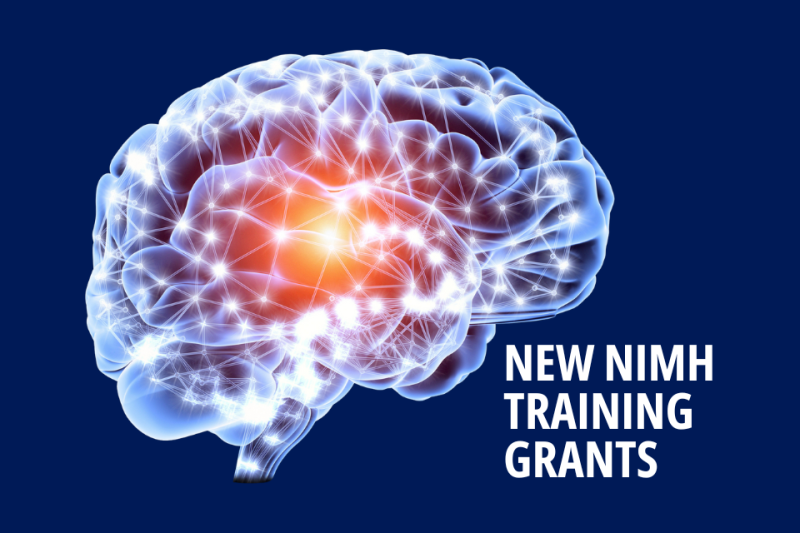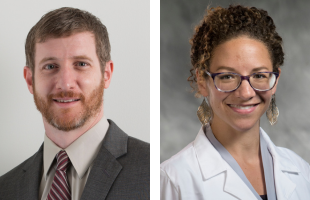
Two new National Institute of Mental Health (NIMH) grants—a $1.1 million R25 awarded to Duke Psychiatry & Behavioral Sciences and a $1.7 million T32 awarded jointly to Duke Psychiatry & Behavioral Sciences and North Carolina Central University—will provide much-needed support toward filling critical gaps in research training opportunities in mental health and developmental neuroscience.
Since the 1980s, the percentage of physicians engaged in research dropped by two-thirds, from 4.7% to 1.5%.* This trend is reflected in psychiatry, and especially in child psychiatry: currently, fewer than 20 child psychiatrist-investigator in the U.S. hold an active NIH R01 grant.
Early-career investigators—whether physicians or PhDs—need robust training and support to launch a research career. But these opportunities are few and far between, particularly in southern states and in programs focusing on children’s mental health and development.
Of 16 NIMH-funded R25 residency programs funded between 2020 and 2023, only two were in the South, and no NIMH R25 programs in southern states supported psychiatrist-scientist tracks within a child and adolescent psychiatry residency. Likewise, of NIMH-funded T32 programs funded during the same time frame, fewer than 20% were focused on child mental health and/or developmental neuroscience, and only one was in a southern state. The lack of geographic diversity among these training programs limits southern institutions’ ability to recruit and retain promising trainees.
These grants will help Duke University and North Carolina Central University (NCCU)—one of the largest Historically Black Colleges and Universities (HBCU) in the country—address these shortages while also engaging budding scientists who reflect a broader range of backgrounds and experiences.
R25 Grant: Supporting Residents & Fellows
The new R25 grant will expand and enhance the Duke Psychiatry Physician Scientist Track (Duke-PST), established in 2012 to give selected residents protected research time during their psychiatry residency. Many of the residents who have completed this program have transitioned into academic appointments where they’ve continued their research, received independent funding, and published their work. The grant will support 10 trainees over five years.
“Receiving this funding will improve our recruitment substantially. It’s a real stamp of approval from NIH, which is sort of the gold standard for biomedical research.”
— Jonathan Posner, MD

“Receiving this funding will improve our recruitment substantially. It’s a real stamp of approval from NIH, which is sort of the gold standard for biomedical research,” noted Jonathan Posner, MD, J. P. Gibbons Distinguished Professor of Psychiatry and the department’s vice chair for research. Posner serves as the grant’s co-principal investigator, along with Heather Vestal, MD, assistant professor and psychiatry residency director.
For a typical four-year residency, Duke-PST will offer three months of full-time research during each of the first and second years. The program will also integrate child psychiatry training, an area where the shortage of physician scientists is particularly acute and an area of considerable strength at Duke.
Jamie Courtland, MD, PhD, a third-year resident in the Duke-PST, works with associate professor Kimberly Carpenter, PhD, to investigate how co-occurring conditions, such as anxiety and ADHD, impact young autistic children’s ability to perceive the world around them and learn. Their aim is to identify differences in the brains of children with these co-occurring conditions, which will help inform the creation and implementation of targeted interventions to promote their growth and development.
Courtland is looking forward to the enhanced career development programming the R25 grant will offer as she considers how to craft a meaningful career in science and medicine after completing residency. “I am excited for additional sessions on navigating the balance between clinical and research responsibilities, as well as training on how to develop and sustain a successful research program,” she said. “The R25 will also help support additional collaboration amongst physician-scientists by facilitating participation in scientific meetings and mentoring sessions.”
T32 Grant: Providing Postdoctoral Research Support
Psychiatric and neurodevelopmental conditions in children are common and often co-occurring, and they can lead to lifelong challenges that impact quality of life. In addition, many psychiatric disorders that manifest in adulthood have roots in early childhood brain development.
The T32-supported Duke-NCCU Interdisciplinary Postdoctoral Training Program in Child Psychiatric and Neurodevelopmental Conditions (DN-IPT) will provide interdisciplinary research training in developmental approaches aimed at improving the diagnosis and treatment of these conditions. Fellowships will range from two to three years, and the grant will support ten fellows over five years.
A key strength of the DN-IPT is the partnership between Duke and NCCU, which includes faculty mentors and trainees at both institutions, joint trainings and seminars, student research internships, and program directors at both institutions. Posner and William Cleland Distinguished Professor Geraldine Dawson, PhD, will lead the project at Duke, and Ju-Ahng Lee, PhD, an associate professor of biological and biomedical sciences, will head the program at NCCU.

“We’re excited about this unique partnership. Within the NIMH portfolio, there are no other T32 grants that have a co-PI partnership with an HBCU,” Posner said. “For young up-and-coming Black scientists, I think the opportunity to do their postdoctoral research training at an HBCU will be really appealing. And it also offers an opportunity for a lot more cross-pollination between the two campuses.”
“We are truly excited about this collaborative research opportunity. Post-doctoral researchers in the exciting fields of neuroscience and child psychiatry will work with faculty at NCCU and Duke, which will not only greatly benefit the researchers, but also students at both institutions.”
— Ju-Ahng Lee, PhD
Lee added, “We are truly excited about this collaborative research opportunity. Post-doctoral researchers in the exciting fields of neuroscience and child psychiatry will work with faculty at NCCU and Duke, which will not only greatly benefit the researchers, but also students at both institutions.”
Madeleine Bruce, PhD, one of Duke’s first postdoctoral hires under the DN-IPT, studies how infants’ early experiences interact with their developing neurobiology to lay the foundation for language and cognition across early childhood. Under the mentorship of associate professor Liz Conradt, PhD, Bruce hopes to expand this line of work by investigating these relationships among high-risk populations, including infants with prenatal exposure to stress as well as those born preterm.
“Participating in the T32 program at Duke will not only enhance my research and scientific communication skills, but also provide invaluable networking opportunities that will enable me to develop an independent program of research,” Bruce reflected. “I am most excited about the opportunity to gain advanced training with clinical child populations under the guidance of esteemed leaders in the field.”
Bruce’s ultimate goal is to uncover avenues for early intervention that can promote resilient outcomes in infants at risk for neurodevelopmental challenges.
Program Synergy and the Pipeline Vision
Helping early-career scientists develop the experience and skills to become independent investigators takes a great deal of time, mentorship, and financial resources, said Posner, and these grants provide the necessary infrastructure and support. Plus, training in bioinformatics, biostatistics, experimental design, and other research skills apply to both programs, creating efficiencies and synergies.
Posner also envisions another synergy across programs: a true, multi-stage pipeline that paves the way for novice researchers to develop into skilled investigators.
“Let’s say someone interested in psychiatry completes their MD/PhD training at Duke and then enters the Physician Scientist Track of our psychiatry residency,” he explains. “And if they want their research career to focus on questions related to development, they could then move into the T32 program to do their postdoc training here and at NC Central. We’d love to see a pipeline for trainees across both institutions.”
*National Institutes of Health. Physician-Scientist Workforce (PSW) Working Group Report and Milewicz DM, Lorenz RG, Dermody TS, Brass LF. Rescuing the physician-scientist workforce: the time for action is now. The Journal of Clinical Investigation 2015; 125(10): 3742-7.